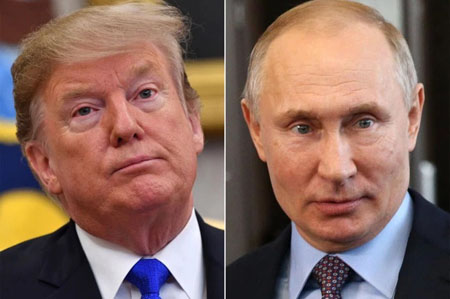by WorldTribune Staff, May 14, 2019
U.S. Secretary of State Mike Pompeo met Russian President Vladimir Putin in the Black Sea city Sochi as President Donald Trump has renewed efforts to build a rapport with Moscow now that the investigation of Special Counsel Robert Mueller has concluded.
Trump had also discussed strategy and a new arms control accord, which could eventually include China, when he spoke last week by phone with Russian President Vladimir Putin.

But Chinese Foreign Minister Wang Yi, who met with Russian Foreign Minister Sergei Lavrov in Sochi on May 13, said Beijing wasn’t interested in negotiating a nuclear arms control treaty with the United States and Russia.
In February, Trump suspended U.S. participation in the 1987 Intermediate-Range Nuclear Forces (INF) Treaty after what his administration said was Russia’s development and deployment of a missile system that violates the pact.
Moscow, which denies the accusation, later also suspended its participation the INF.
Geostrategy-Direct.com, in a February report following the U.S.’s announcement that it intended to suspend participation in the INF, noted that China was critical of the U.S. though Beijing had itself managed to build a large stockpile of intermediate-range missiles by sidestepping membership in the INF treaty.
“Remaining outside the pact has allowed China to rapidly expand its missile arsenal as part of a military strategy designed to counter U.S. and allied military power in Asia,” the U.S.-China Economic and Security Review Commission said, according to the Geostrategy-Direct report.
Related: Report: China exploited INF treaty to build massive missile force, February 5, 2019
Moscow and Washington have also been gearing up for talks on how and whether to extend the New START treaty, the only U.S.-Russia arms control pact limiting deployed strategic nuclear weapons, Radio Free Europe/Radio Liberty reported on May 14.
New START is set to expire in February 2021 but can be extended for five years if both sides agree.
On May 13, Trump told reporters at the White House that he intended to meet Putin at the Group of 20 summit in Japan next month.
Putin said he hoped to “fully restore” ties between Moscow and Washington, and suggested he believed Trump wanted to do the same.
He also applauded as “quite an objective investigation” Mueller’s probe, which did not find evidence that Trump or his campaign sought to collude with Russian officials to impact the 2016 U.S. election.
Ahead of that scheduled meeting, Russian state TV broadcast a visit by Putin to a military flight test center in southern Russia, where he inspected a new nuclear-capable “hypersonic” missile.
Pompeo, during a joint news conference with Lavrov on May 14, said further meddling in U.S. elections by Russia “would put our relationship in an even worse place than it has been.”
Lavrov said both countries needed to dispel “suspicions and prejudices” and to “start building a new constructive framework.”
Asked by reporters whether the timing of Putin’s tour, ahead of his meeting was Pompeo, was intentional, Kremlin spokesman Dmitry Peskov dismissed that.
“There’s no need to come up with any conspiracy theories here,” he was quoted as saying.
Your Intel Brief: Geostrategy-Direct __________ Fix The Media Now
